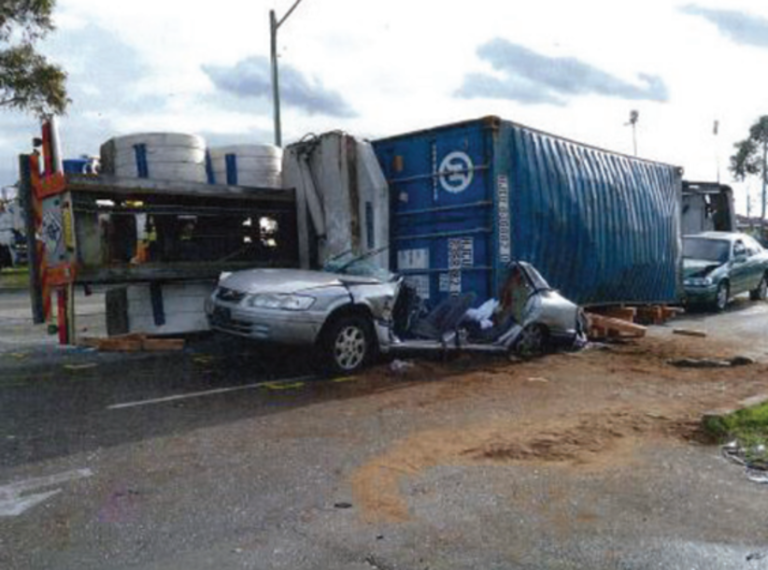Rising shipping costs and a shortage of containers have led to an increased risk of truck rollovers as importers pack containers to the brim.
This is one of the many takeaways from a webinar on load restraint organised by the National Road Safety Partnership Program. Titled “Ignorance is No Excuse,” the webinar hosted by NRSPP’s director Jerome Carslake mined the brain of Daniel Brain, load restraint specialist at Toll Group.
To be sure, container-laden heavy vehicles are more likely to rollover in a crash. Gaps inside containers can cause loads to shift and the truck carrying it to become unstable. Worst of all though are containers with high centre of gravity loads that can become unstable and roll when navigating bends or turns.
“Even the smallest amount of load shifts in a container can have a profound effect on vehicle stability,” said Brain.
Meanwhile, rising shipping costs is increasing the risks, particularly in the high centre of gravity category, as packing containers to the brim is now more common, said Brain. Shipping costs have trebled, and in some cases are four times as high, as just a couple of years ago.
“Australian consigners have been held legally responsible for fatal outcomes of such crashes, even though the container was packed overseas,” said NRSPP.
“We started to look at this issue in 2019. We saw the prevalence of container rollover increasing. It was definitely an issue to look into, said Brain, himself a former truck driver. Toll’s investigations asked: “What’s causing the risk?, What are the risks in causing the container road rollover?”
Toll used data from NTI, or National Transport Insurance, Australia’s largest insurer of trucks, in its investigation.
The NTI data shows that a container-laden vehicle is 23 percent more likely to rollover than other heavy vehicles. There are others more likely, for example log carriers. It’s worth noting though that a container rollover is more likely in an urban environment than say a logging vehicle that travels through mainly rural roads and not urban centres.
Brain said there are three primary risks in container loads:
- Inadequate load restraint where a load inside a container has gaps on the sides which will allow the load to move.
- Unbalanced loading, for example, light on one side and heavy on another
- High centre of gravity loadings. This is the greatest risk where the higher the load is in the container the more the likelihood of instability and rollovers.
Usually, the first indication a driver is going to get that a load isn’t packed properly is when it starts to shift and destabilise the vehicle.
As the host Carslake said in a comment on LinkedIn after the webinar, “What I find it incredible here is the truck driver really has no idea what risk they are taking on board with a container. It can be totally legal regarding mass yet dangerous.”
It’s almost impossible for a driver to check the container they are supposed to be carrying before taking off onto the road. Port facilities don’t have areas for trucks and drivers to hang about opening container doors. Even if they could, a visual check of the back of the load isn’t going to tell them much. In addition, there are bio-security and quarantine rules which means some containers can only be opened under special circumstances.
Containers are packed without a driver, or even the importer or consignor present. Some countries don’t have rules like ours in Australia and that’s where it’s crucial that consignors effectively communicate with container packers their plan for the loads.
In Australia, when things go bad, it’s consigners and directors that are being prosecuted, not the road transport operator. So just who is a consignor?
If you are a container importer, and you are organising the collection of the container, you will be classed as a consignor. Brain said larger companies seemed to be aware of their obligations under chain of responsibility laws here in Australia, and that medium and small companies less so.
The only time you know if a container has been packed properly is when it is unloaded. Brain said it’s critical that consignors check loads have been packed according to their load plan and that they act on non-conformances. Transport operators and consignors should also support drivers in refusing to travel due to loading concerns, he said.
The webinar was organised after Brain was named winner of the NRSPP “Best Paper with Implications for Improving Workplace Road Safety” award at the Australasian Road Safety Conference in 2021. Brain’s presentation at that event was titled , “Consignors of import containers play a critical role in preventing heavy vehicle rollover, but they’re often unaware of their role.”






